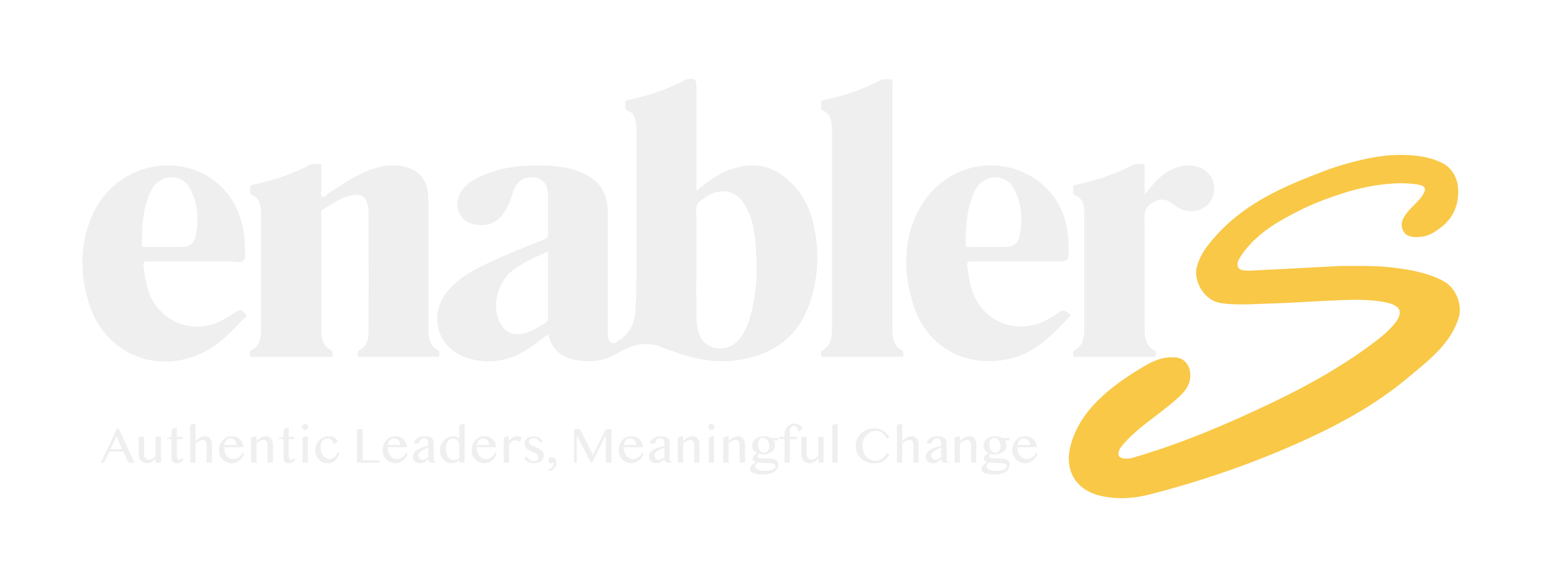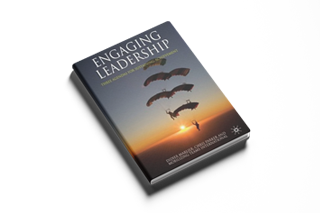 Blog article by Marvin Faure, Partner at the Enablers Network
Blog article by Marvin Faure, Partner at the Enablers Network
THE CONTEXT
Companies seek to develop profitable growth. They operate in an uncertain world and thus frequently face the need to make major changes, made necessary by geopolitical realignment, supply chain shocks, competitive action, regulatory changes, new technologies, AI, labour market transformation, political polarisation, mergers and acquisitions (amongst many other disruptions to business-as-usual).
The Covid-19 pandemic and re-election of President Trump have underlined the extent to which navigating complexity has become a crucial skill for executive teams for the foreseeable future. Complexity clearly isn’t going away and requires a different approach to corporate strategy than the traditional long-term planning cycles.
The hoped-for transformations bring their own uncertainties, so companies often look for external support. A common choice is to work with large consulting firms. However, like any other business, the fundamental goal of consultants is growth. The major firms have now become so large[1] that there are no untapped markets left, and in order to continue to grow, they must extract as much value as possible from their existing or new clients. Their business model and the personal wealth of their partners therefore depends on creating dependence and repeat business. It is simply not in their interests to transfer their expertise and allow their clients to become independent.
The current state of the consulting industry was documented in a 2023 book by Mariana Mazzucato and Rosie Collington, The Big Con: How the Consulting Industry Weakens our Businesses, Infantilizes our Governments and Warps our Economies. This is not a hatchet job by disgruntled ex-consultants. The authors[2],[3] are specialists in public policy, disinterested and well-placed to document the problems caused by over-reliance on consultants. It is important to note that they are not against consulting per se. Indeed, they state in the introduction:
“Organisations and individuals with genuine knowledge and capacity can be a valuable source of advice; but they should advise and ‘consult’ from the sidelines in a transparent way that brings real knowledge and expertise – rather than be allowed to run the show from the centre.”
They go on to add: “Ultimately this expertise must render those being advised stronger, not weaker.”
Unfortunately, this is not always the case.
The book documents how the consulting industry earns “incomes that far exceed the actual value it provides”, hollowing out clients in the process and thus creating long-term dependence. In addition, the consultants take little or no responsibility for the outcomes of their work, thus making their high earnings even harder to justify.
The major consulting firms themselves admit as much, if we read between the lines:
“A new BCG global analysis shows that only 1 in 4 transformations deliver value-creating, enduring change” – Boston Consulting Group, June 2024
“70% of transformations fail.” – McKinsey & Company, July 2019
Of course, they will claim that the actual work done with the consultant is often missing elements to deliver the full value potential, or that the figures given don’t apply to their own projects. But is this true? Anecdotal evidence, and our own experience coming in to help with failed transformation projects, suggest that the failures are predictable:
1. Plans are developed by the consultants with little or no attempt at co-creation or employee engagement.
2. The plans do not adequately account for uncertainty.
3. The consultants make only cursory efforts to understand the culture of the organisation, let alone the complete ecosystem.
4. The resulting plans are imposed, with rigid targets, KPIs, and linked compensation, thus making the needed course corrections very difficult.
Notwithstanding the undoubted value that strategy consultants can bring, these are major problems that any executive team should be seriously concerned about.
WHY DOES THIS KEEP HAPPENING?
Why do so many large companies spend so much money on the major consulting firms, for such a poor ROI? I’m speculating here, but I think there are a number of possible reasons.
1. Many executives are not familiar with or comfortable with the tools and methods for managing in complexity.
2. Uncertainty has become so high that executives lack confidence in their ability to take the right decisions, and seek reassurance in “expert” opinion.
3. Recommendations from a major consulting form often provide cover for controversial decisions, allowing the CEO to diffuse (or even evade) personal responsibility.
4. Down-sizing and cost-saving measures often mean that neither the resources nor the competence is available in-house.
TAKING BACK CONTROL
Given their track record, and the poor alignment between their interests and those of their customers, calling in a major consulting firm should be seen as a last resort, for very specific needs only. Before picking up the phone, the most important questions to ask are:
1. What, precisely, do we need the consultants to do?
2. Why are we unable to do this with internal resources?
3. How do we ensure that the consultants add considerably more value than cost?
4. How do we manage the execution, while avoiding the dependency trap?
But wait, perhaps there’s a better way. Why not go direct to the heart of the matter?
WHAT IS THE ALTERNATIVE?
Leadership skills are the key to unlocking the organisation’s potential.
Leaders must become comfortable with complexity and leading when they don’t (and in reality, can’t) know the answers. The fact remains, however, that many leaders have reached their current position due to their expertise and are deeply uncomfortable with admitting they don’t know.
You are certainly more expert in your business than we are at the Enablers Network. We are not going to tell you which markets to enter, which technologies to develop or which plant must be closed.
What we will do, as leadership experts, is to assist you in creating the high-performance leadership culture that will ensure your long-term success.
Our approach is thus to accompany the leaders as they solve live business problems while developing their leadership skills for complex, chaotic and disruptive contexts.
We can’t do this, however, without doing some consulting work. This typically includes working with you to diagnose and understand the existing leadership culture and ecosystem within which it functions.
HOW ARE WE DIFFERENT?
Why is our consulting any different from the major consulting firms criticised above?
In one example, the merger of two global firms in the chemistry industry was running into trouble. Rather than take a top-down approach, we ran sessions with the intact leadership teams of the new BUs and major functions to co-create the strategy and execution plans. While they developed their own strategies, we intervened to create a common leadership style, based on the principles of high-performance executive teams and “leading when you don’t know”. The result? Within a few months, there was no more “us and them”, just One Team working together.
We differ from the major consulting firms in at least three ways.
First, our mission at Enablers is “to enable leaders to achieve the extraordinary in a complex and uncertain world”. We see consulting as a means, not an end. The end is the acquisition by your leaders of the skills to lead effectively in today’s uncertain world, finding your own solutions without depending on others. Consulting is for us the means, because unless we invest enough time in a discovery and diagnosis process to understand your business, your operating systems and your culture, our work with you can barely scratch the surface.
If transformation is to be successful, all the backbone processes of the company, including strategy development, strategy execution, goal-setting, budgeting, planning, performance evaluation and remuneration. must be aligned, and in today’s complex and uncertain world, subject to frequent validation and adjustment as new information becomes available.
Our consulting interventions are thus designed to co-create, with you, the changes needed to transform the company, whether these be strategy, process, behavioural or cultural. Our methods are based on complexity science and enable the agility your organisation needs to cope with constant uncertainty. In this context, strategy is best seen as an intent, or a desired direction, with the precise path emerging in response to the ever-changing context. These methods, and the associated skills, are eminently transferable.
The second point is that our partners in the Enablers Network are very different to the typical consultant. The network includes business executives, military survival experts, elite athletes, sports coaches and outstanding talents from the performance arts. Many of us have had long, successful careers in well-known global companies, and have joined Enablers in order to pass our knowledge on to the younger generations. We are motivated by your success, not by the need to reach a performance target. We are proud of our work and stand by it.
Thirdly, we are far smaller than the major consulting firms. What you see is what you get. There is no bait-and-switch by the Senior Partner, with the work done by junior consultants fresh out of school. Equally, we have neither the need nor the desire to create dependency. We want to make a significant impact within a reasonable period of time, transfer our skills and knowledge and then move on somewhere else.
Interesting? Please contact us for a strategic conversation about thriving in uncertainty ([email protected] // +33661191172)
[1] The global consulting industry is big: estimated at up to $1.0tr in 2024 and growing at a CAGR of at least 4%. They are amongst the biggest and most influential privately-held firms in the world.
[2] Mazzucato is a highly-respected Professor in the Economics of Innovation and Public Value at University College London, and holds numerous high-level policy roles, both with national governments and international institutions. She has won a number of prestigious international prizes, including Italy’s highest civilian honour, the Grande Ufficiale Ordine al Merito della Repubblica Italiana. Mazzucato has written several other books, including The Entrepreneurial State and The Value of Everything, shortlisted for the 2018 Financial Times and McKinsey Business Book of the Year prize.
[3] Collington is a political economist and PhD candidate at University College London.


0 Comments